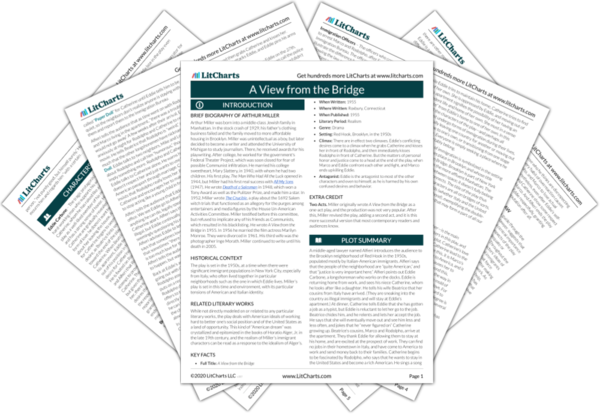One of Eddie’s main concerns in the play is his honor and the respect (or lack thereof) he gets from those around him. Other characters are also concerned with these issues, as matters of personal honor and reputation are of great importance in the close-knit community of Red Hook. But these issues are explored most fully through the character of Eddie. Eddie works hard to support his family and has a proud sense of personal honor. At the beginning of the play, he is a respected, well-liked member of his community. But the play follows his tragic demise as he loses the respect of others and his good reputation. He constantly worries about being disrespected or dishonored by Catherine, Beatrice, Marco, and especially Rodolpho. Closely related to the concepts of honor or respect is the idea of reputation, which can be understood as a more social form of honor. In addition to Eddie’s personal sense of honor, he is greatly concerned with his reputation amongst his neighbors. He is infuriated when Marco spits on him and accuses him of turning him in to the Immigration Bureau (even though Eddie really did do it) because these actions are disrespectful and dishonor Eddie, but especially because they occurred in public, in front of the neighborhood. After Eddie’s reputation is tarnished, his neighbors Lipari, Louis, and Mike ignore and ostracize him.
While Eddie does lose the respect of others around him, part of the problem with his obsession with respect and honor is that he has a rather warped idea of the concepts. Whenever Beatrice or Catherine disagrees with him, he interprets this as a sign of disrespect. Furthermore, he thinks that Rodolpho disrespects and dishonors him merely by spending time with Catherine. In the end, Eddie loses the respect of his family and community precisely because he is so overly concerned and defensive regarding his own honor and reputation. He interprets all sorts of things as affronts to his personal honor and lashes out against those who he thinks are disrespecting him. Then, ironically, this very habit of overreaction causes Catherine, Beatrice, Rodolpho, and Marco to lose actual respect for him gradually. Nonetheless, even after Eddie’s self-destructive decline, Beatrice and Catherine show some respect for him, when he is stabbed by Marco. And Alfieri ends the play by affirming that he still mourns Eddie respectfully, granting Eddie some vestige of a positive reputation after all.
Respect, Honor, Reputation ThemeTracker

Respect, Honor, Reputation Quotes in A View from the Bridge
Eddie:
There was a family lived next door to her mother, he was about sixteen—
Beatrice:
No, he was no more than fourteen, cause I was to his confirmation in Saint Agnes. but the family had an uncle that they were hidin’ in the house, and he snitched to the Immigration.
Catherine:
The kid snitched?
Eddie:
On his own uncle!
Catherine:
What, was he crazy?
Eddie:
He was crazy after, I tell you that, boy.
Beatrice:
Oh, it was terrible. He had five brothers and the old father. And they grabbed him in the kitchen and pulled him down the stairs—three flights his head was bouncin’ like a coconut. And they spit on him in the street, his own father and his brothers. The whole neighborhood was cryin’.

Unlock explanations and citation info for this and every other A View from the Bridge quote.
Plus so much more...
Get LitCharts A+That one! I accuse that one!
Alfieri:
To promise not to kill is not dishonorable.
Marco:
No?
Alfieri:
No.
Marco:
Then what is done with such a man.
Alfieri:
Nothing. If he obeys the law, he lives. That’s all.
Marco:
The law? All the law is not in a book.
Alfieri:
Yes. In a book. There is no other law.
Marco:
He degraded my brother. My blood. He robbed my children, he mocks my work. I work to come here, mister!
Alfieri:
I know, Marco—
Marco:
There is no law for that? Where is the law for that?
Alfieri:
There is none.
Eddie:
Didn’t you hear what I told you? You walk out that door to that wedding you ain’t comin’ back here, Beatrice.
Beatrice:
Why! What do you want?
Eddie:
I want my respect. Didn’t you ever hear of that? From my wife?
Catherine:
How can you listen to him? This rat!
Beatrice:
Don’t you call him that!
Catherine:
What’re you scared of? He’s a rat! He belongs in the sewer!
I want my name! He didn’t take my name; he’s a punk. Marco’s got my name—and you can run tell him, kid, that he’s gonna give it back to me in front of this neighborhood, or we have it out.
Maybe he come to apologize to me. Heh, Marco? For what you said about me in front of the neighborhood? . . . Wipin’ the neighborhood with my name like a dirty rag! I want my name, Marco.
I confess that something perversely pure calls to me from his memory—not purely good, but himself purely, for he allowed himself to be wholly known and for that I think I will love him more than all my sensible clients. And yet, it is better to settle for half, it must be! And so I mourn him—I admit it—with a certain . . . alarm.











